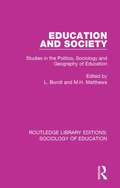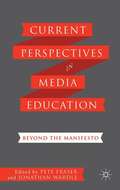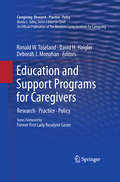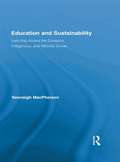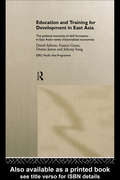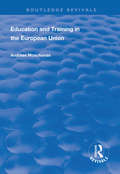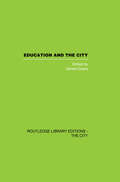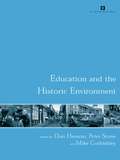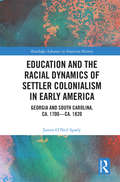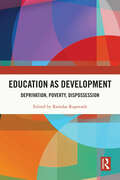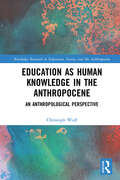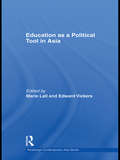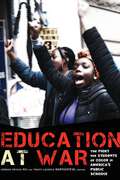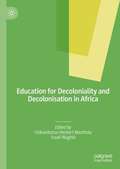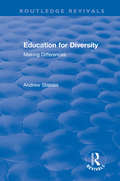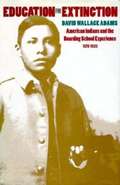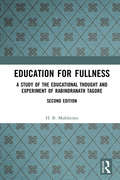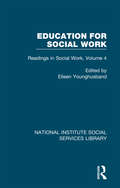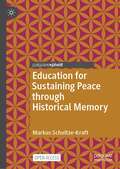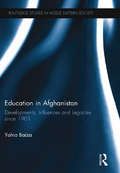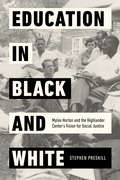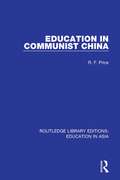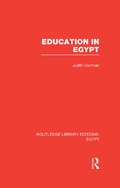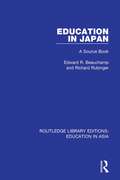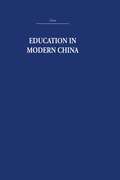- Table View
- List View
Education and Society: Studies in the Politics, Sociology and Geography of Education (Routledge Library Editions: Sociology of Education #9)
by L. Bondi M. H. MatthewsThis book, first published in 1988, examines the most contentious issues in contemporary education. The political, social, educational and geographical impact of changes in the provision of educational services are discussed and illustrated through a wide range of case studies. Issues are examined from a number of different perspectives, amongst them those of the parent, the educational administrator and the organisational theorist, with the result that eh book is able to evaluate which changes are most consistent with the requirements of each group. This book will be of interest to students of sociology and education.
Education and State Formation
by Andy GreenThis book emerged from the online project 'A Manifesto for Media Education' and takes forward its starting points by asking some of the original contributors to expand upon their view of the purpose of media education and to support their perspective with accounts of practice.
Education and Support Programs for Caregivers
by Deborah J. Monahan David H. Haigler Ronald W. ToselandFor many, caring for a chronically ill family member is "the right thing to do", but it is also often a source of emotional hardship, physical stress, and social isolation. In response, skill-building, coping, and psychoeducational programs have emerged to help caregivers meet the changes and challenges in their - as well as the patients' - lives. Education and Support Programs for Caregivers reveals the diversity of the caregiver population as well as their experiences and needs, and it introduces an empirically solid framework for planning, implementing, and evaluating caregiver programs. The book synthesizes current trends, exploring the effectiveness of different types of programs (e.g., clinic, community, home based) and groups (e.g., peer, professional, self-help), and how supportive programs lead to improved care. Coverage includes: Improving service delivery of education and support programs to underserved caregivers.Cultural, ethnic, and gender issues in conducting caregiver education and support groups.Utilization patterns (e.g., a key to understanding service needs).E-health, telehealth, and other technological developments in caregiver services.Evaluating the effectiveness and sustainability of programs.Recommendations for future practice, training, policy, and advocacy.Education and Support Programs for Caregivers offers a wealth of insights and ideas for researchers, practitioners, and graduate students across the caregiving fields, including psychology, social work, public health, geriatrics and gerontology, and medicine as well as public and education policy makers.
Education and Sustainability: Learning Across the Diaspora, Indigenous, and Minority Divide (Routledge Research in Education)
by Seonaigh MacPhersonThis book critically examines the impact of migration, education, development, and the spread of English on global bio-linguistic and cultural diversity. Derived from findings from a comparative eco-linguistic study of intergenerational language, culture, and education change in the Tibetan Diaspora, the book extends its analysis to consider the plight of other peoples who find themselves straddling the Indigenous-Minority-Diaspora divide. MacPherson explores the overlapping and distinctive sustainability challenges facing indigenous and minority communities when they are connected by and within diasporas, and seeks to adequately explain the discontinuities and disjunctures between their educational struggles and achievement levels.
Education and Training for Development in East Asia: The Political Economy of Skill Formation in Newly Industrialised Economies (ESRC Pacific Asia Programme)
by Johnny Sung David Ashton Francis Green Donna JamesThe East Asian miracle, or its supposed demise, is always news. The Four Tiger economies of Hong Kong, Singapore, Taiwan and South Korea have experienced some of the fastest rates of economic growth ever achieved. This book provides the first detailed analysis of the development of education and training systems in Asia, and the relationship with the process of economic growth.
Education and Training in the European Union (Routledge Revivals)
by Andreas MoschonasPublished in 1998, Education and training in the European Union is a policy area aiming to enable young people to experience the ‘reality of Europe’ through various forms of cooperation, including training periods in firms in other member states, university courses in the Community countries and exchanges. This book examines why the Community decided to take actions in the field of education and training, what the extent of this involvement is, and how the future may affect EU decisions on education and training. It argues that the logic of the EU involvement in education and training derives from both economic and political considerations; that the extent of this involvement has not so far been very significant but is growing; and that the pace of political integration will ultimately condition the Community’s competence in the field of education and training.
Education and the City: Theory, History and Contemporary Practice
by Gerald GraceCity schools, especially those attended by working class and ethnic minority pupils are teh catalysts of many significant issues in educational debate and policy making. They bring into sharp focus questions to do with class, gender and race relations in education; concepts of equality of opportunity and of social justice; and controversies about the wider political economic and social context of mass schooling. America, Western Europe and Australia have all taken a keen interest in the problems of urban schooling. The contributors to this collection of original essays all share a concern about these problems, although they approach them from a wide range of theoretical and ideological positions. Gerald Grace and his contributors criticis the current limitations of urban education as a field of study and they present a foundation for a more historically located and critically informed inquiry into problems, conflicts and contradictions in urban schooling. Part I presents contributions on theories of the urban. Part II focuses upon the history of urban education both in Britain and the USA. Part III discusses contemporary policy and practice with essays relating to education in inner city London and in New York City. This book was first published in 1984.
Education and the Historic Environment (Issues in Heritage Management)
by Peter Stone Don Henson Mike CorbishleyPractical, inspiring and instructive, Education and the Historic Environment emphasizes the contribution to both education and heritage that results from a positive relationship between the two disciplines. Education and the Historic Environment examines evidence, case studies and chapters from a wide cross section of the heritage sector and: argues for the value of using the physical remains of the past shows how and where the historic environment can be used to fit into and enhance learning examines how guidelines are reinforced looks at how physical heritage can not only be used to teach obvious subjects such as history, but are also useful across the curriculum, from literacy and numeracy to citizenship. Teachers at all levels, and students, academics and professionals in archaeology and heritage management, will all be able to use the case studies to reform and enhance their work.
Education and the Racial Dynamics of Settler Colonialism in Early America: Georgia and South Carolina, ca. 1700–ca. 1820 (Routledge Advances in American History #16)
by James O’Neil SpadyThis is the first historical monograph to demonstrate settler colonialism’s significance for Early America. Based on a nuanced reading of the archive and using a comparative approach, the book treats settler colonialism as a process rather than a coherent ideology. Spady shows that learning was a central site of colonial struggle in the South, in which Native Americans, Africans, and European settlers acquired and exploited each other’s knowledge and practices. Learned skills, attitudes, and ideas shaped the economy and culture of the region and produced challenges to colonial authority. Factions of enslaved people and of Native American communities devised new survival and resistance strategies. Their successful learning challenged settler projects and desires, and white settlers gradually responded. Three developments arose as a pattern of racialization: settlers tried to prohibit literacy for the enslaved, remove indigenous communities, and initiate some of North America's earliest schools for poorer whites. Fully instituted by the end of the 1820s, settler colonization’s racialization of learning in the South endured beyond the Civil War and Reconstruction.
Education as Development: Deprivation, Poverty, Dispossession
by Ramdas RupavathThis book is an in-depth analysis of the educational development of tribals in India. Education as Development: Deprivation, Poverty, Dispossession is a significant new addition for understanding educational and economic setbacks experienced by the marginalized in India. The volume:• Focuses on how the social, economic and education systems have evolved over time in India and identifies the scope of development in these areas;• Provides a rational structure for readers to understand how the Adivasi in India can be made to fit in the modern designed education system;• Highlights the problems of the marginalized – such as income inequality, education, health, housing, governance, civil society environment and infrastructure and others which hampers their overall growth. This book will be of great interest to students and researchers and policy makers in the fields of education, minority studies, indigenous studies, sociology of education, and South Asian studies.
Education as Human Knowledge in the Anthropocene: An Anthropological Perspective (Routledge Research in Education, Society and the Anthropocene)
by Christoph WulfThis book examines the concepts of the Anthropocene and globalisation in our society and the changes that these are bringing about in education and human learning. The book argues that there needs to be reflexive approach to issues that affect the fate of the planet and the future of humans, brought about by an education that looks to the future. Wulf argues that a change in education and socialization can only succeed based on an understanding of previous educational ideas, and considers the significance of Confucianism and spiritual education that emerged in the East. The book traces key educational ideas throughout history to show how education and human knowledge are closely linked, highlighting the need for us to pay careful attention to repetition, mimesis and the imagination in learning. It shows how a future-oriented education must engage with issues of peace and violence, global citizenship and sustainable development. This timely and compelling book will be of great interest to researchers, academics and students in the fields of philosophy of education, the history and anthropology of education, sustainability education and global citizenship education
Education as a Political Tool in Asia (Routledge Contemporary Asia Series)
by Edward Vickers Marie LallThis book offers a fresh and comparative approach in questioning what education is being used for and what the effects of the politicisation of education are on Asian societies in the era of globalisation. Education has been used as a political tool throughout the ages and across the whole world to define national identity and underlie the political rationale of regimes. In the contemporary, globalising world there are particularly interesting examples of this throughout Asia, ranging from the new definition of Indian national identity as a Hindu identity (to contrast with Pakistan's Islamic identity), to particular versions of nationalism in China, Japan, Singapore and Vietnam. In Asia education systems have their origins in processes of state formation aimed either at bolstering 'self-strengthening' resistance to the encroachments of Western and/or Asian imperialism, or at furthering projects of post-colonial nation-building. State elites have sought to popularise powerful visions of nationhood, to equip these visions with a historical 'back-story', and to endow them with the maximum sentimental charge. This book explores all of these developments, emphasising that education is seen by nations across Asia, as elsewhere, as more than simply a tool for economic development, and that issues of national identity and the tolerance - or lack of it - of ethnic, cultural or religious diversity can be at least as important as issues of literacy and access. Interdisciplinary and unique in its analysis, this book will be of interest to scholars of political science, research in education and Asian Studies.
Education at War: The Fight for Students of Color in America's Public Schools
by Arshad Imtiaz Ali and Tracy Lachica BuenavistaEducation at War: The Fight for Students of Color in America's Public Schools, attempts to shape educational research and practice to more explicitly consider the relationship between education, capitalism and war, and more specifically, its’ impact on students of color. The authors, as a whole, contend that the contemporary specter of war has become a central way that racism and materialism become manifested and practiced within education. In particular, this collection asserts that the contemporary neoliberal characterization of education and school-based reform is situated within the global political economy that has facilitated a growth in the prison and military industrial complex, and simultaneous divestment in education domestically within the U.S.Education at War attempts to make research relevant by bringing the tensions within young people’s lives to the fore. The heavy shadow cast by recent U.S. led wars re-organizes the sites of learning and teaching nationally, as well as differentially, within specific sites and upon particular communities. Nonetheless, the examination of this context is not enough. Rather, we consider how such a contemporary context can facilitate educational spaces for communities and youth to grow their vision for a different, and hopefully a more humanizing future. Thus, the book contributors will collectively explore how resistance can produce the opportunity for rich, diverse and transformative learning for marginalized students and communities.The lives of People of Color are the forefront of Education at War: The Fight for Students of Color in America's Public Schools. Whereas there are many attempts to theorize about the global implications of war, less attention is paid to the ways that war shapes young lives in the U.S., particularly in an educational context. The book addresses the absence of youth-centered discussions regarding education during a political context of neoliberalism and war, and provides important perspectives on which to ground critical discussions among students and families, education scholars and practitioners, and policymakers.
Education for Decoloniality and Decolonisation in Africa
by Yusef Waghid Chikumbutso Herbert ManthaluThis book focuses on understandings of higher education in relation to notions of decoloniality and decolonization in southern Africa. The volume draws on a range of case studies in multiple politico-cultural contexts on the African continent, and examines some of the challenges to be overcome in order to achieve education for decolonization and decoloniality. Acknowledging that patterns of exclusion, inequality and injustice are still prevalent in the African higher education landscape, the editors and contributors proffer bold attempts at democratizing education and examine how to cultivate just, equal and diverse pedagogical relations. Featuring case studies from South Africa, Zambia, Malawi, and Zimbabwe, the authors and editors examine how higher education can be further democratized and transformed along the lines of equality, liberty and recognition of diversity. This hopeful and bold collection will be of interest to scholars of decoloniality and decolonization in higher education, as well as higher education in southern Africa more specifically.
Education for Diversity: Making Differences (Routledge Revivals Ser.)
by Andrew StablesThis book was published in 2003. Certain social and cultural changes have problematized many of the assumptions that underpinned educational thinking in the 20th century. These can be grouped under three broad headings: individualization, globalization and the ecological challenge. Each of these has potentially profound implications for education that have been little explored. Rising to the challenge, this volume examines individualization in relation to changing attitudes to childhood and the positioning and identity development of students within educational "markets". It discusses globalization from several crucial perspectives, including the reduced sovereignty of the nation state and the problematizing of notions of distance and proximity. The ever-increasing environmental crisis is considered in terms of the possibilities for education for sustainable development.
Education for Extinction: American Indians and the Boarding School Experience, 1875-1928
by David Wallace Adams(back of book) Winner Caughey Western History Association Book Prize Before and after photos of a Navajo student at the Carlisle School, ca. 1880 and 1883, courtesy of the National Anthropological Archives, Smithsonian Institution "This is, quite simply, a wonderful book. In lively prose, Adams tells the poig(nat) (covered by library sticker) ... linst American Indian chil(dren) (covered by library computer sticker) who sought to use bo(th) transforming Indian ] "3 1463 0066913173 mg. doing, and living. Adams demonstrates convincingly that Native American students were anything but passive recipients of the'curriculum of civilization.'" -Choice "Everything is here: the cropped hair and army uniforms, the endless drilling and marching, the round of daily chores, the spells in the guardhouse for speaking Indian, and the ubiquitous little school graveyards that signaled the terrible toll these institutions took on young lives. Required reading for all students of United States race relations." -London Times Higher Education Supplement "A story worth reading and remembering, one that reveals the use of education as a weapon of war, a method of domination. A strong lesson in the potential for education to become part of a political and cultural arsenal." -American Journal of Education "Persuasive and moving, this book is full of good stories that should appeal to the general public." -Brian Dippie, author of The Vanishing American: White Attitudes and U.S. Indian Policy "An important contribution to the literature of Indian-white relations." -Robert M. Utley, author of The Lance and the Shield: The Life and Times of Sitting Bull "Richly detailed and extremely well written." -Western Historical Quarterly David Adams is associate professor of education at Cleveland State University.
Education for Fullness: A Study of the Educational Thought and Experiment of Rabindranath Tagore
by H. B. MukherjeeThis volume is the first comprehensive exploration of Rabindranath Tagore’s works on education and pedagogy. It presents a valuable account of the creation of Santiniketan and Visva-Bharati, Tagore’s vision of social regeneration, and his rejection of the colonial scheme; while reflecting on significant events of his life and his ideas. The book evaluates Tagore’s unique contribution to education and discusses his views on fundamental issues, such as aim, method, discipline, and medium. It reinforces for readers today the relevance of his experiments and activities in the field of education. Drawing from various sources, the book also offers bibliographic information on Tagore’s writing on education. This new edition with a new Introduction and Foreword will be of immense value to educationists, teachers, policymakers, and those interested in modern Indian history and the philosophy of education.
Education for Social Work: Readings in Social Work, Volume 4 (National Institute Social Services Library)
by Eileen YounghusbandSome outstanding contributions to a better understanding of the issues of education for social work have been brought together in this volume, originally published in 1968. Because of the wide relevance of the subject these articles should be valuable not only to social work educators and field supervisors in many different parts of the world, but to others concerned with professional education. Today it can be enjoyed in its historical context.
Education for Sustaining Peace through Historical Memory (Memory Politics and Transitional Justice)
by Markus Schultze-KraftInformed by the author’s long-standing work on violent conflict, peace and education in countries of the Global South, particularly Colombia, this open access book presents a comprehensive narrative about the relationship between peace education, historical memory and the sustaining peace agenda, advocating for the adoption of a new perspective on education for sustaining peace through historical memory. Education on and for peace in countries wrestling with, or emerging from, protracted violent conflict is up against major challenges, and both conventional and critical approaches to peace education are limited to address these. Incorporating a focus on historical memory, without losing sight of its own pitfalls, into peace education can support learners and teachers to come to grips with achieving positive, peace-sustaining change at both the micro (individual) and macro (social and institutional) levels, and to develop concepts and practices of effective and legitimate alternatives to violence and war. Conceived in these terms, historical memory-oriented peace education also stands to enhance the work-in-progress that is the UN-led sustaining peace agenda, including its Sustainable Development Goals.
Education in Afghanistan: Developments, Influences and Legacies Since 1901 (Routledge Studies in Middle Eastern Society)
by Yahia BaizaA comprehensive and up to date study of the history of education in Afghanistan since 1901, this book demonstrates how modern education emerged and charts its fluctuating process of development, regression and destruction. Combining historical and contemporary analysis of key international and national, political, and historical issues from the late nineteenth century to the present day, Education in Afghanistan examines; religion, modernism, tribal and ethnic conflict, language discrimination, foreign invasions, war, and international assistance through the lens of education. An in-depth understanding of these elements will provide alternative approaches to addressing the on-going conflict in Afghanistan, which has a direct effect on the overall educational development and policy-making decisions in the country. Offering a new perspective to the conflict in Afghanistan by addressing its impact on education, this book will be an invaluable resource for students and researchers interested in the formation of education policy, social and political reform in the Middle East, and Islamic Studies.
Education in Black and White: Myles Horton and the Highlander Center's Vision for Social Justice
by Stephen PreskillHow Myles Horton and the Highlander Folk School catalyzed social justice and democratic education For too long, the story of life-changing teacher and activist Myles Horton has escaped the public spotlight. An inspiring and humble leader whose work influenced the civil rights movement, Horton helped thousands of marginalized people gain greater control over their lives. Born and raised in early twentieth-century Tennessee, Horton was appalled by the disrespect and discrimination that was heaped on poor people—both black and white—throughout Appalachia. He resolved to create a place that would be available to all, where regular people could talk, learn from one another, and get to the heart of issues of class and race, and right and wrong. And so in 1932, Horton cofounded the Highlander Folk School, smack in the middle of Tennessee.The first biography of Myles Horton in twenty-five years, Education in Black and White focuses on the educational theories and strategies he first developed at Highlander to serve the interests of the poor, the marginalized, and the oppressed. His personal vision keenly influenced everyone from Rosa Parks and Martin Luther King, Jr., to Eleanor Roosevelt and Congressman John Lewis. Stephen Preskill chronicles how Horton gained influence as an advocate for organized labor, an activist for civil rights, a supporter of Appalachian self-empowerment, an architect of an international popular-education network, and a champion for direct democracy, showing how the example Horton set remains education’s best hope for today.
Education in Communist China (Routledge Library Editions: Education in Asia #8)
by R.F. PriceThis book, first published in 1970 and revised in 1975, lays out the background to the Chinese educational system and attempts of the communist leadership to reform the school system. It analyses the educational implications of the Cultural Revolution and the difficulties Mao faced in his attempts to introduce new educational policies. This book forms a valuable case study in the reform of education.
Education in Egypt: Egypt: Education In Egypt (Routledge Library Editions: Egypt)
by Judith CochranEgyptian education is a central, social and economic force in the Middle East. For hundreds of years Al Azhar University has been the centre of Islamic thinking and education. More recently Egypt became the leader in secular education as Mohammed Ali established the first medical, veterinarian, engineering and accounting schools in the Middle East. Nasser expanded Egyptian educational leadership by providing free education for Muslem students from neighbouring countries. The extensive exportation of Egyptian educators to initiate and educate in schools and universities throughout the Arab speaking world has shaped the secular and religious leaders of those countries. This book traces the history of Egyptian education over the last hundred years and highlights the key factors which have given Egyptian education its particular quality and influence within the Arab world. First published 1986.
Education in Japan: A Source Book (Routledge Library Editions: Education in Asia #9)
by Richard Rubinger Edward R. BeauchampThis book, first published in 1989, includes essays on a number of the most important topics in Japanese education as well as the highly selected, and annotated, bibliographies. It is the editors' belief that understanding educational matters requires insight into the historical context, and have therefore placed contemporary Japanese educational matters in historical perspective.
Education in Modern China
by R.F. PriceFirst published in 1970 this re-issues the revised edition of 1979. This book examines the part played both by tradition and by the Cultural Revolution in the educational system of twentieth century China and explores the apparent reversal of policy which took place since the death of Mao. The book discusses the writings of Mao on the nature of man, society and knowledge and his ideas on education. These are then seen in the context of history, philosophy and religion. Educational aims and policies are discussed, showing how factors such as language, geography, economics and the social structure created obstacles to reform.
